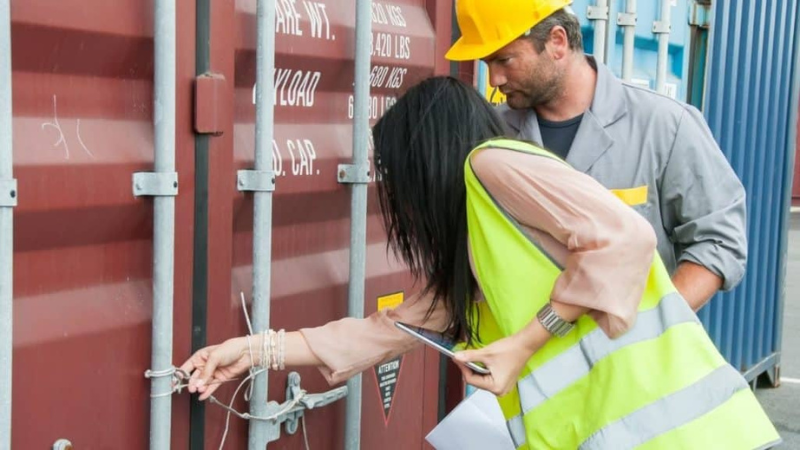When it comes to transporting high-value shipments, security is a top priority. Have you ever wondered how companies ensure that goods remain untampered during transit? Security seals are a critical part of this process. These small, often overlooked tools play a massive role in protecting shipments from theft, fraud, or contamination. In this article, we’ll explore how security seals ensure the integrity of high-value shipments, their benefits, and best practices for their use.
What Are Security Seals?
Security seals are tamper-evident mechanisms used to secure containers, packages, or shipments during transportation. They come in various forms, including plastic seals, bolt seals, cable seals, and adhesive labels, each serving a unique purpose based on the security needs of the shipment.
Unlike locks, which can often be opened and re-locked, security seals are designed to provide clear evidence of tampering. If a seal is broken or altered, it immediately signals that the shipment may have been compromised.
Types of Security Seals
Different types of security seals are used for specific applications. Here’s an overview of the most commonly used types:
1. Bolt Seals
Bolt seals are heavy-duty seals used for securing shipping containers, trucks, and rail cars. They are strong, durable, and require specialized tools to remove.
2. Cable Seals
Cable seals feature a metal cable that can be adjusted and tightened around the securing point. These seals are highly flexible and are often used in industries like logistics, customs, and aviation.
3. Plastic Seals
Plastic seals are lightweight and cost-effective. They are commonly used for securing packages, bags, and smaller shipments. They’re designed to be tamper-evident but are less robust than bolt or cable seals.
4. Adhesive Labels and Tape
These seals provide tamper evidence by showing visible marks or messages if an attempt is made to remove or alter them. They’re frequently used for smaller, high-value packages.
5. Electronic Seals
Electronic seals incorporate advanced technology such as RFID or GPS tracking. They provide real-time monitoring and are ideal for extremely high-value or sensitive shipments.
Benefits of Security Seals for High-Value Shipments
1. Tamper Evidence
One of the primary purposes of a security seal is to provide tamper evidence. If a seal is broken, it immediately indicates that the shipment has been accessed without authorization.
2. Deterrence Against Theft
The presence of a security seal acts as a deterrent for potential thieves or unauthorized personnel. Knowing that any tampering will be evident reduces the likelihood of an attempt.
3. Accountability and Tracking
Security seals often have unique serial numbers that allow for tracking and documentation. This feature creates a chain of custody, ensuring accountability throughout the shipping process.
4. Compliance with Regulations
Many industries, such as pharmaceuticals, food, and electronics, require the use of security seals to comply with regulatory standards. Using seals ensures that shipments meet these requirements and safeguards their integrity.
5. Enhanced Customer Confidence
High-value shipments are often destined for critical business operations or individual customers. Using security seals demonstrates a company’s commitment to delivering goods securely, boosting customer confidence and trust.
Industries That Rely on Security Seals
1. Logistics and Transportation
The logistics industry uses security seals to protect shipments from tampering, theft, and unauthorized access. They are widely applied in trucking, rail, and air freight.
2. Pharmaceuticals
In the pharmaceutical sector, maintaining the integrity of medical supplies and drugs is essential. Security seals ensure that these high-value, sensitive items remain unaltered during transportation.
3. Food and Beverage
Food-grade security seals protect shipments from contamination. They ensure that food and beverage products are delivered safely and meet hygiene standards.
4. Electronics
High-value electronics are particularly vulnerable to theft. Security seals provide an added layer of protection for items like smartphones, laptops, and components during transit.
5. Customs and Border Protection
Customs agencies around the world mandate the use of security seal for cargo entering or leaving a country. Seals ensure compliance with international shipping regulations.
How to Choose the Right Security Seal
Selecting the appropriate security seal depends on several factors, including the type of shipment, the level of security required, and industry regulations. Here are some tips to help you choose the right seal:
1. Assess the Level of Security Needed
For shipments at high risk of theft or tampering, such as electronics or jewelry, opt for robust seals like bolt or cable seals. For lower-risk items, plastic seals or adhesive labels may suffice.
2. Consider the Type of Container or Package
Different seals are designed for specific applications. For instance, bolt seals are ideal for shipping containers, while plastic seals work well for smaller packages.
3. Look for Tamper-Evident Features
Ensure that the seal provides clear tamper evidence, such as visible markings or unique serial numbers.
4. Check for Compliance with Industry Standards
Many industries have specific requirements for security seals. For example, C-TPAT (Customs-Trade Partnership Against Terrorism) mandates the use of high-security bolt seal for cross-border shipments.
5. Evaluate Environmental Conditions
If your shipment will be exposed to extreme weather or rough handling, choose seals that are durable and resistant to environmental factors.
Best Practices for Using Security Seals
1. Proper Installation
Ensure that the security seal is correctly applied and tightened to prevent tampering. Improper installation can compromise the seal’s effectiveness.
2. Record Serial Numbers
Document the serial numbers of seals used for each shipment. This creates an audit trail and helps detect any unauthorized changes.
3. Inspect Seals Regularly
Check seals at various checkpoints during transit to ensure they remain intact. If a seal is found broken or tampered with, investigate immediately.
4. Train Employees
Educate employees on the importance of security seal and how to use them correctly. Proper training reduces the risk of errors and enhances shipment security.
5. Combine with Other Security Measures
While security seals are effective, they should be used in conjunction with other measures, such as GPS tracking, surveillance, and robust packaging.
Innovations in Security Seals
With advancements in technology, security seal are becoming smarter and more efficient. Here are some emerging trends:
1. RFID-Enabled Seals
Radio Frequency Identification (RFID) technology allows for real-time tracking of shipments. RFID-enabled seals can provide data on the seal’s location and condition.
2. GPS Tracking
Some electronic seals now feature GPS tracking, enabling companies to monitor their shipments in real time and respond quickly to any suspicious activity.
3. Biodegradable Seals
As sustainability becomes a priority, manufacturers are developing eco-friendly, biodegradable seals that minimize environmental impact without compromising security.
4. Tamper-Resistant Materials
Innovative materials are being used to make seals more resistant to tampering, ensuring even greater protection for high-value shipments.
Challenges in Using Security Seals
While security seal are highly effective, they are not without challenges:
1. Cost
High-quality security seal can be expensive, particularly for small businesses shipping high volumes.
2. Human Error
Incorrect application of seals can compromise their effectiveness.
3. Sophisticated Tampering Techniques
Criminals are continually developing methods to bypass security seal, making it essential for companies to stay updated on the latest seal technologies.
4. Disposal Concerns
Non-biodegradable seals contribute to environmental waste. Transitioning to eco-friendly options can help mitigate this issue.
Final Thoughts
Security seals are indispensable tools in ensuring the integrity of high-value shipments. From providing tamper evidence to enhancing accountability and compliance, these simple yet effective devices play a crucial role in modern logistics and transportation.
By understanding how security seals work and following best practices, businesses can protect their valuable goods, maintain customer trust, and meet industry standards. Whether you’re a small business owner or a logistics professional, investing in the right security seals is a smart move to safeguard your shipments and operations.
Have you considered upgrading your security measures to include advanced seals? Now’s the time to take that step toward safer and more secure shipping practices.











